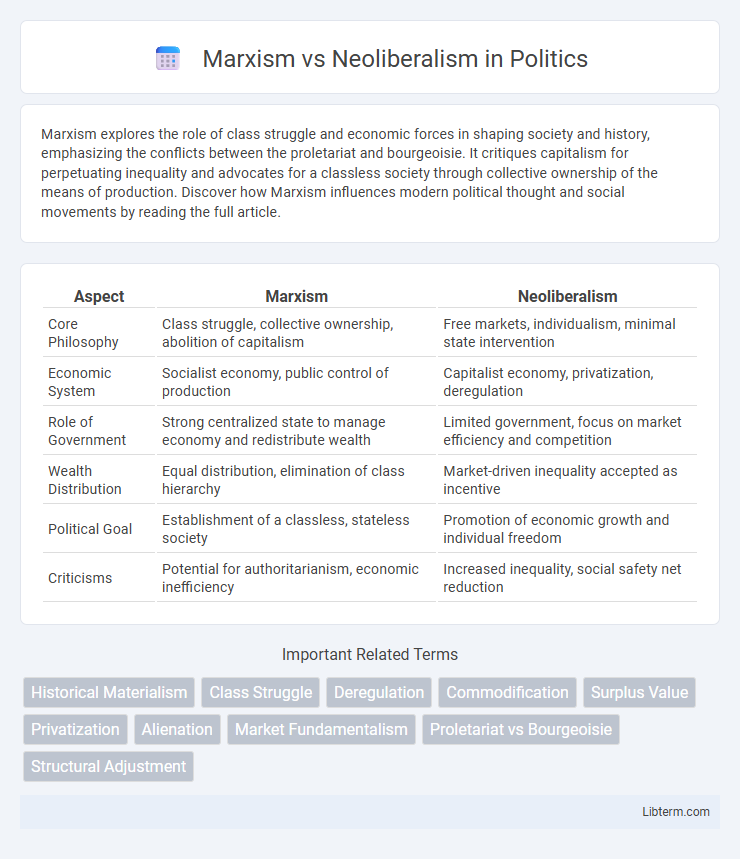Marxism explores the role of class struggle and economic forces in shaping society and history, emphasizing the conflicts between the proletariat and bourgeoisie. It critiques capitalism for perpetuating inequality and advocates for a classless society through collective ownership of the means of production. Discover how Marxism influences modern political thought and social movements by reading the full article.
Table of Comparison
| Aspect | Marxism | Neoliberalism |
|---|---|---|
| Core Philosophy | Class struggle, collective ownership, abolition of capitalism | Free markets, individualism, minimal state intervention |
| Economic System | Socialist economy, public control of production | Capitalist economy, privatization, deregulation |
| Role of Government | Strong centralized state to manage economy and redistribute wealth | Limited government, focus on market efficiency and competition |
| Wealth Distribution | Equal distribution, elimination of class hierarchy | Market-driven inequality accepted as incentive |
| Political Goal | Establishment of a classless, stateless society | Promotion of economic growth and individual freedom |
| Criticisms | Potential for authoritarianism, economic inefficiency | Increased inequality, social safety net reduction |
Introduction: Defining Marxism and Neoliberalism
Marxism is a socio-economic ideology centered on class struggle, advocating for the abolition of capitalism and establishment of a classless society through collective ownership of the means of production. Neoliberalism promotes free-market capitalism, emphasizing deregulation, privatization, and limited government intervention to drive economic growth and individual freedom. These contrasting frameworks shape distinct perspectives on economic policy, social justice, and the role of the state in society.
Historical Origins and Development
Marxism originated in the 19th century through the works of Karl Marx and Friedrich Engels, emphasizing class struggle, capitalism's critique, and advocating for a proletarian revolution to establish socialism. Neoliberalism emerged in the mid-20th century as a response to Keynesian economics, promoting free-market capitalism, deregulation, and reduced government intervention, with key figures such as Friedrich Hayek and Milton Friedman shaping its development. The historical trajectories of Marxism focus on dismantling capitalist systems, while neoliberalism centers on revitalizing market mechanisms within modern economies.
Core Principles of Marxism
Marxism centers on the critique of capitalism, emphasizing class struggle, the abolition of private property, and the establishment of a classless society through collective ownership of the means of production. Its core principles include historical materialism, the labor theory of value, and the concept of alienation under capitalist systems. Marxism advocates for dismantling capitalist structures to achieve social equality and economic justice, contrasting sharply with neoliberalism's focus on free markets and individualism.
Fundamental Tenets of Neoliberalism
Neoliberalism centers on free-market capitalism, emphasizing deregulation, privatization, and reduced government intervention to promote economic growth and efficiency. It posits that individual entrepreneurial freedoms and open markets lead to optimal resource allocation and wealth creation. This contrasts with Marxism's critique of capitalist structures and its advocacy for collective ownership and wealth redistribution.
Approaches to Economy and Market Regulation
Marxism advocates for collective ownership of the means of production and centralized planning to address class inequalities and control capital flow, rejecting market-driven allocation. Neoliberalism emphasizes free markets, deregulation, and minimal state intervention to promote competition, innovation, and individual entrepreneurship. While Marxism critiques capitalism's inherent exploitation and advocates redistribution, neoliberalism relies on market mechanisms to efficiently allocate resources and drive economic growth.
Perspectives on Class, Labor, and Inequality
Marxism views class struggle as the central driver of historical change, emphasizing the exploitation of the proletariat by the bourgeoisie and advocating for collective ownership of the means of production to reduce inequality. Neoliberalism promotes individual entrepreneurship, free markets, and minimal state intervention, asserting that labor markets should be flexible and inequality is a natural outcome of meritocratic competition. While Marxism critiques the capitalist system for perpetuating class oppression and deepening income disparities, neoliberalism argues that economic growth fueled by market efficiency ultimately benefits all social strata.
Role of the State in Society
Marxism views the state as an instrument of class oppression, serving the interests of the ruling capitalist class while advocating for its eventual withering away to establish a classless society. Neoliberalism emphasizes a limited state role focused on protecting property rights, enforcing contracts, and ensuring free markets without heavy intervention, promoting privatization and deregulation. The Marxist theory calls for state control of the means of production to achieve social equality, whereas neoliberalism prioritizes market mechanisms and minimal state interference in economic affairs.
Impact on Globalization and International Relations
Marxism critiques globalization as a process driven by capitalist exploitation, emphasizing class struggle and economic inequality across borders, while neoliberalism promotes globalization as a pathway to free markets, deregulation, and global economic integration. In international relations, Marxism views global institutions as tools for maintaining capitalist dominance and imperialism, contrasting with neoliberalism's support for multilateral cooperation and global governance to facilitate trade and investment. The divergent impacts shape policies on trade, labor rights, and financial regulation, influencing the balance of power in the global system.
Key Criticisms and Contemporary Debates
Marxism criticizes neoliberalism for perpetuating economic inequality, exploiting labor, and prioritizing capital accumulation over social welfare, while neoliberalism advocates argue that free markets drive efficiency and innovation. Key contemporary debates focus on market regulation versus state intervention, with Marxists emphasizing systemic class struggle and the unsustainability of capitalism, whereas neoliberals defend deregulation and individual entrepreneurial freedom. The polarization over wealth distribution, environmental sustainability, and social justice remains central to understanding the ideological clash between Marxist theory and neoliberal policies.
Conclusion: Comparing Relevance in the Modern World
Marxism analyzes class struggle and economic inequality as central to social dynamics, while neoliberalism emphasizes free markets, individualism, and limited government intervention. In the modern world, neoliberal policies dominate global economies, yet Marxist critiques remain relevant for addressing persistent wealth disparities and systemic exploitation. The tension between these frameworks highlights ongoing debates over economic justice, social welfare, and the role of state power in shaping future societies.
Marxism Infographic

 libterm.com
libterm.com